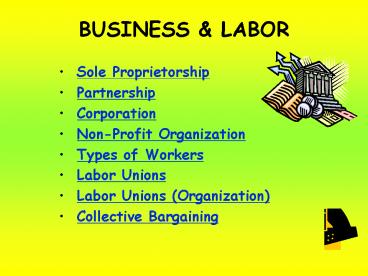BUSINESS PowerPoint PPT Presentation
1 / 9
Title: BUSINESS
1
BUSINESS LABOR
- Sole Proprietorship
- Partnership
- Corporation
- Non-Profit Organization
- Types of Workers
- Labor Unions
- Labor Unions (Organization)
- Collective Bargaining
2
SOLE PROPRITORSHIP Business that is organized by
one single owner.
- Positives
- Easiest type to organize
- Owner has the power to make decisions
- Profit does not have to be shared
- Negatives
- Unlimited liability owner is responsible for
all debts - Limited capital only have your financial
resources - Limited life if owner dies, business must be
reorganized - Employees hard to attract
3
PARTNERSHIPA legal joining of two or more
individuals in a business.The least common form
of business organization. Formed by a legal
agreement called the articles of partnership.
- Positives
- Additional financial capital
- Can share expensive start-up costs
- Each partner brings specific talents
- Negatives
- Unlimited liability financially responsible for
personal as well as business debts of partners - Limited life if partner dies, must reorganize
- Legal structure is complicated
4
CORPORATIONA business recognized by law rights
responsibilities of an individual own
property, pay taxes, sue or be sued. Corporations
are formed through a charter granted by the
government.
- Positives
- Raise through the sale of stocks/bonds
- Limited liability only responsible for what you
invest in company - Professional managers
- Unlimited life many professionals involved,
business does not need to be reorganized
- Negatives
- Expensive complex to start
- Owners have little control/decision making
- Government regulation/corporate income taxes
- Most difficult to organize
5
NON-PROFIT ORGANIZATIONAn organization that
operates like a business to support its members.
- Structured much like a corporation, but do not
operate for a profit. - Non-profits seek to provide a service to its
members, or the community in general. - Examples Churches, YMCA, State Employees Credit
Union
6
TYPES OF WORKERS
- Blue-Collar Worker category of workers employed
in crafts, manufacturing, and non-farm labor. - White-Collar Worker category of workers
employed in offices, sales, or professional
positions. - Agricultural Worker category of workers
involved in farm labor. - Categories of Skill
- Unskilled Worker people whose job requires no
specialized training. - Semi-skilled Worker people whose job requires
some training in job-related skills, often modern
technology. - Skilled Worker people who has learned a trade
or craft either through a vocational school or as
an apprentice. - Professional highly educated individuals with
college degrees and usually additional training.
7
LABOR UNIONS
- Purpose organized to improve wages and working
conditions for its members. - History Labor unions became prevalent during
the early 1900s as the industrial revolution
changed the US economy. - Unions were instrumental in improving working
conditions in factories, working hours, wages,
and creating child labor laws. - Recently labor unions have seen a decline in
membership because of the decline in blue collar
jobs in the US, and the movement of manufacturing
jobs overseas. - Examples
- Craft Union union made up of skilled workers in
a specific trade or industry. - Industrial Union union made up of all workers
in an industry regardless of job or skill level. - AFL-CIO American Federation of Labor Congress
of Industrial Organizations. Organization that
combined Craft and Industrial unions.
8
LABOR UNIONS (2)
- Levels of Organized Labor (Labor Unions)
- Local Union members of a union in a factory,
company, or geographic area. - National Union Individual industrial or craft
unions that represent local unions nationwide. - Federation (AFL-CIO) represents 13 million
people in US and other countries. - Types of Union Agreements
- Closed Shop workers had to belong to the union
in order to be hired by a company. (Taft-Hartley
Act 1947 illegal) - Union Shop must join union after being hired.
(States can ban) - Right-to-Work-Laws States laws preventing
unions from forcing workers to join. - Federal Regulation National Labor Relations
Board
9
COLLECTIVE BARGAINING
- Collective Bargaining process by which union
and company meet to discuss the terms of workers
contracts. - Mediation 3rd party brought in to help reach an
agreement not forced decision. - Arbitration 3rd party listens to both sides and
makes a final decision. - Strike workers in union refuse to work until
demands are met. - Picketing workers carry signs outside business
to alert public of issues workers have with the
company. - Boycott workers urge public to refuse to
purchase goods or services due to worker
treatment. - Lockout company blocks workers from entering
building until workers agree to a contract.

